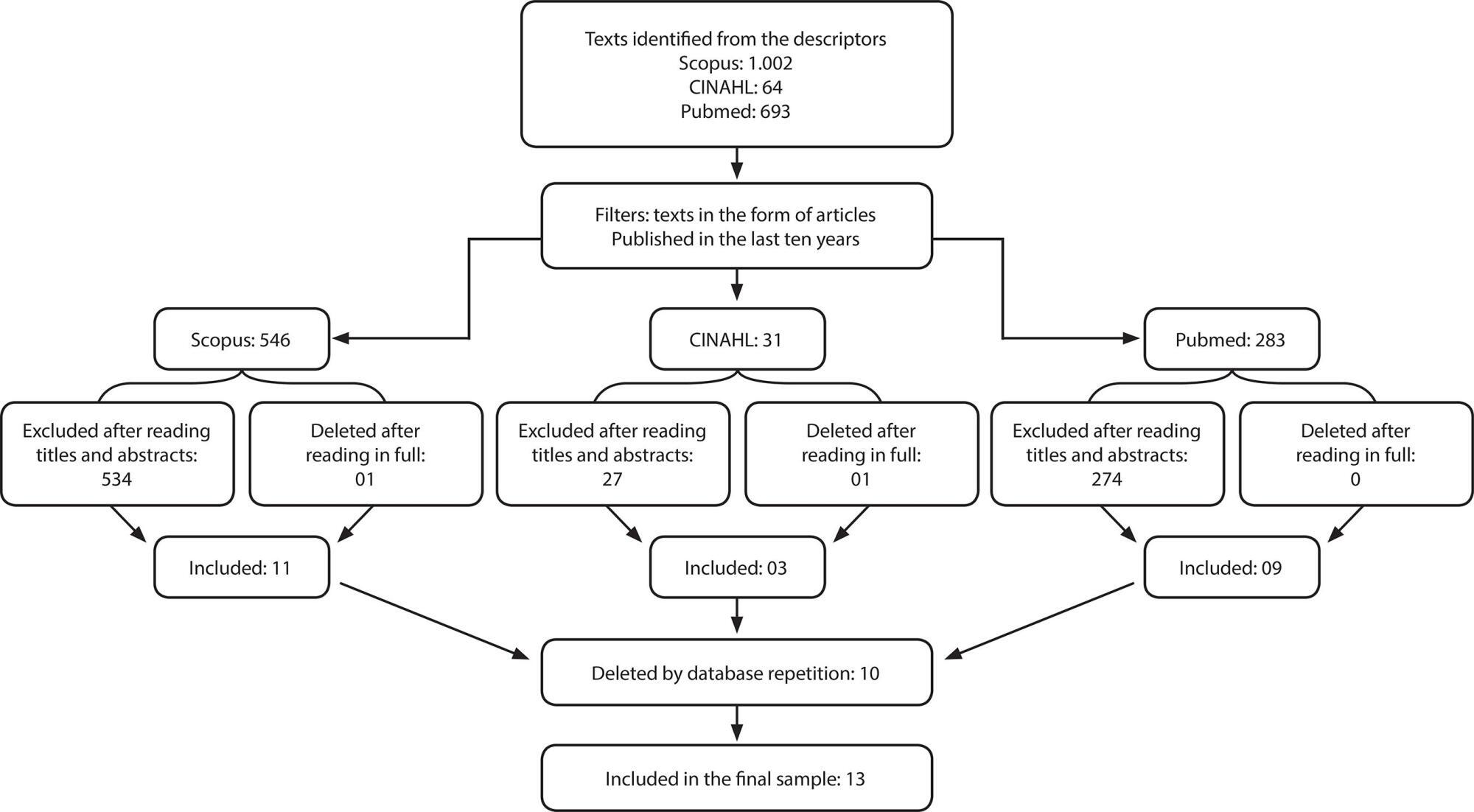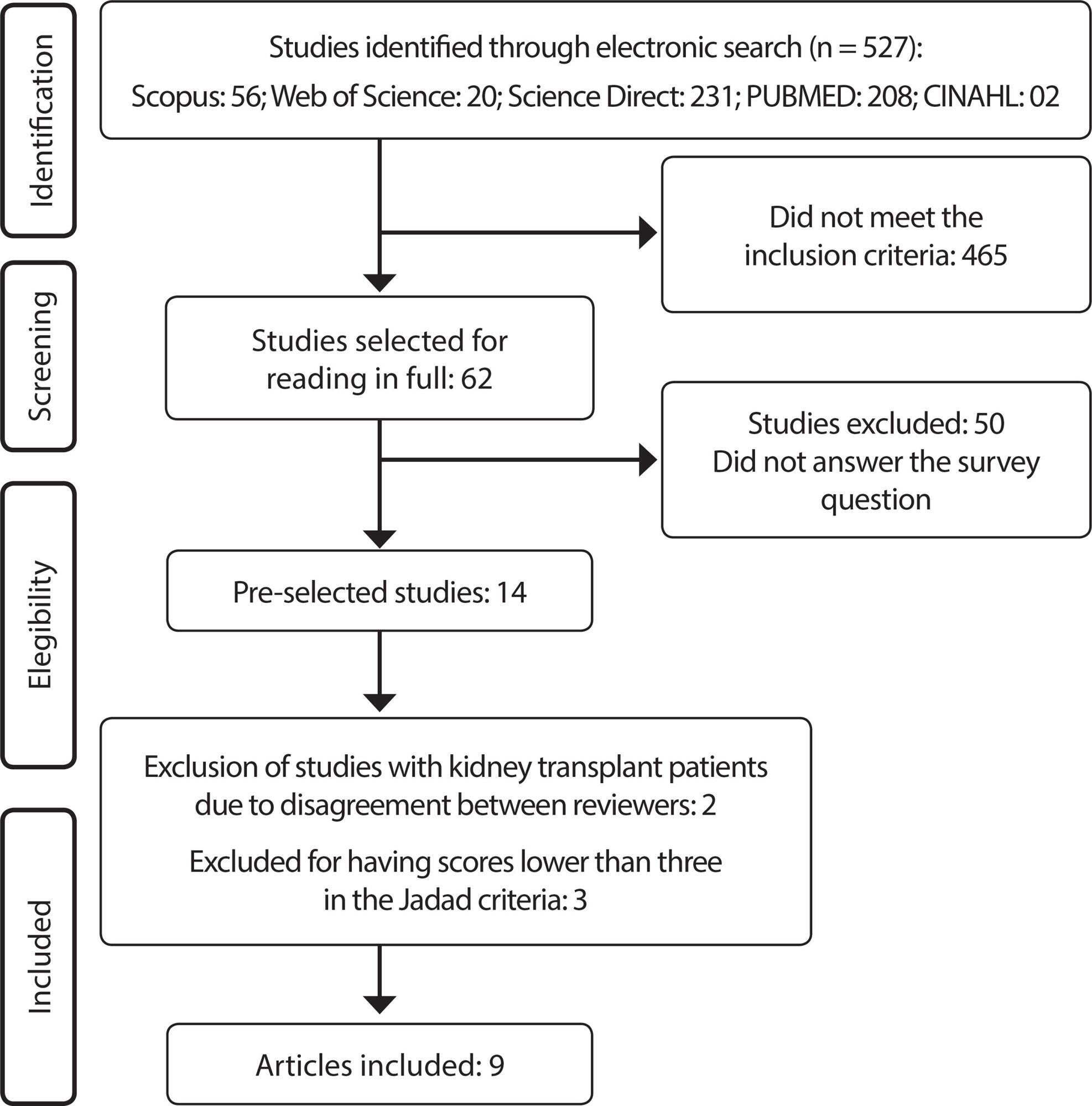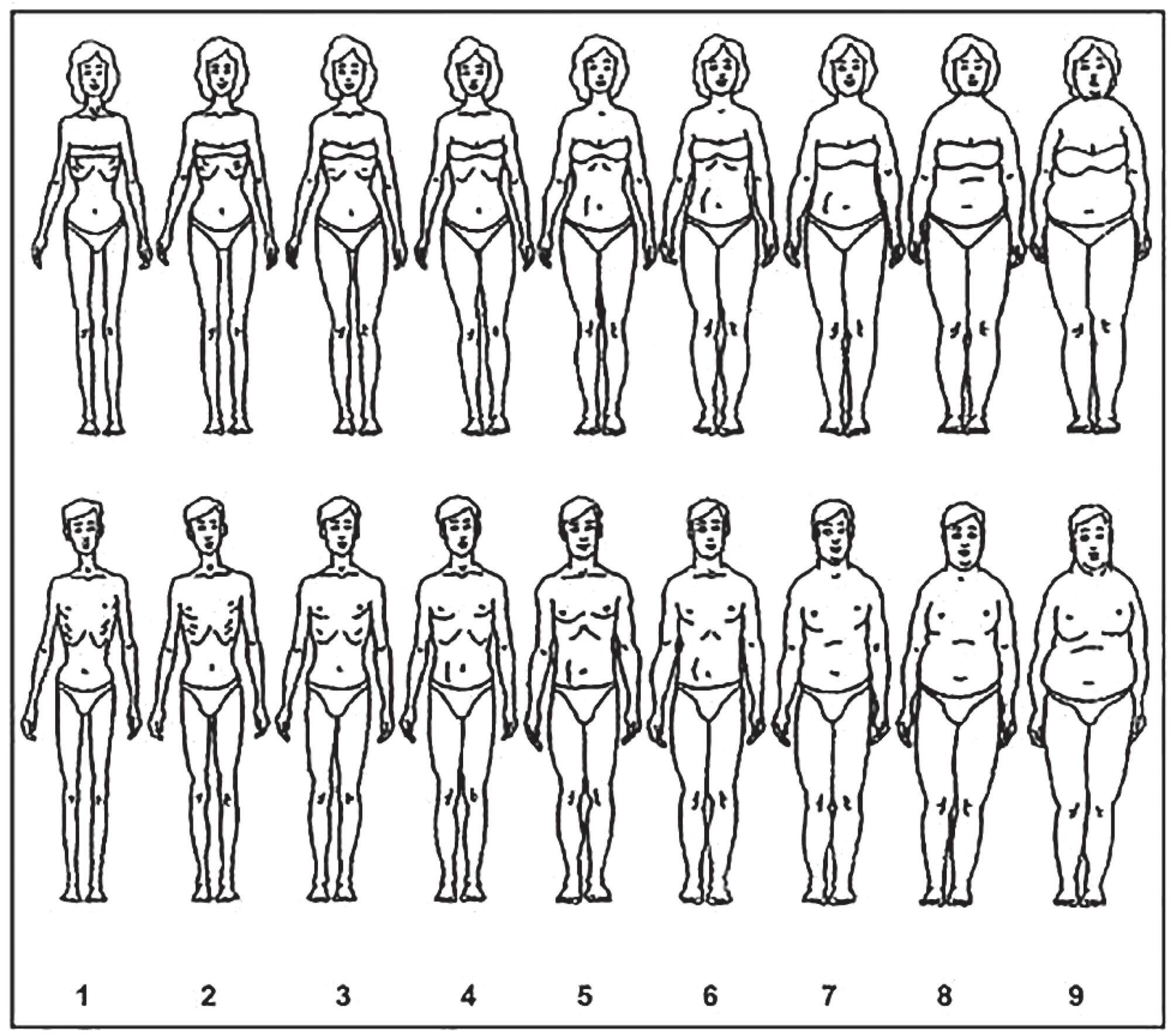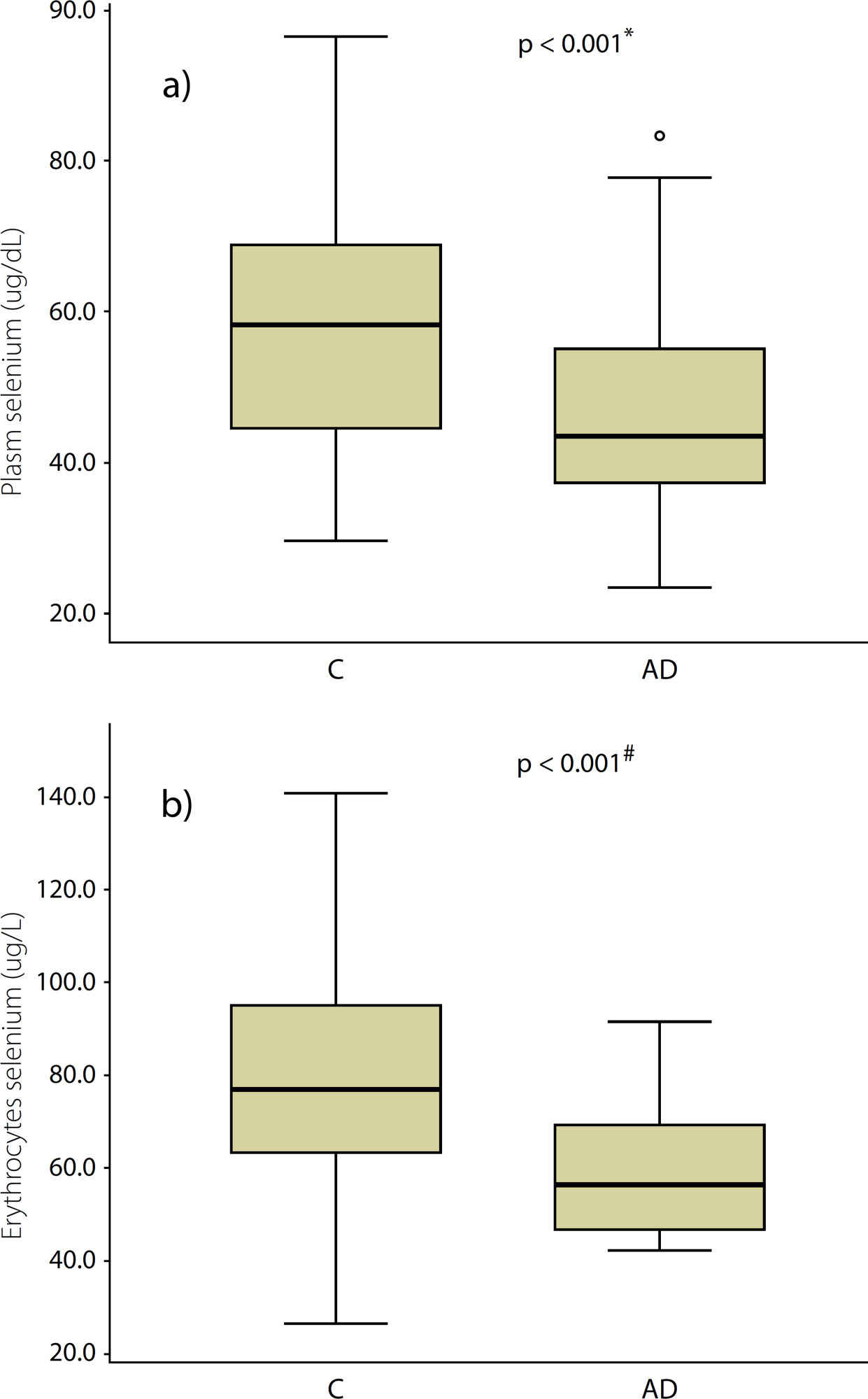-
RESEARCH01-01-2017
Mental health in the Family Health Strategy as perceived by health professionals
Revista Brasileira de Enfermagem. 2017;70(5):935-941
Abstract
RESEARCHMental health in the Family Health Strategy as perceived by health professionals
Revista Brasileira de Enfermagem. 2017;70(5):935-941
DOI 10.1590/0034-7167-2016-0492
Views0See moreABSTRACT
Objective:
to analyze the management of mental health needs in primary care as perceived by Family Health Strategy professionals.
Method:
this was a qualitative descriptive exploratory study developed within the coverage area of five family health teams. The data were collected using observation, group interviews, individual semi-structured interviews, and focus groups. Content analysis was conducted using text analysis software and interpretation was based on the corresponding analytical structures.
Results:
numerous and challenging mental health demands occur in this setting, for which the teams identified care resources; however, they also indicated difficulties, especially related to the operationalization and integration of such resources.
Conclusion:
there is a need for a care network sensitive to mental health demands that are better coordinated and more effectively managed.

-
RESEARCH01-01-2017
Nursing care by telehealth: what is the influence of distance on communication?
Revista Brasileira de Enfermagem. 2017;70(5):928-934
Abstract
RESEARCHNursing care by telehealth: what is the influence of distance on communication?
Revista Brasileira de Enfermagem. 2017;70(5):928-934
DOI 10.1590/0034-7167-2016-0142
Views0See moreABSTRACT
Objective:
Evaluate the perception of nurses regarding interpersonal communication while providing care via telehealth.
Method:
Qualitative research realized with seven nurses working in telehealth in Brazil, the sample was determined by data saturation. A questionnaire with open questions was applied and then content analysis of the dialogues was conducted, focusing on thematic analysis.
Results:
Four categories emerged from the dialogues: Understanding the importance of communication; the interpersonal relationship interfering with communication; Communicating via technology; and Learning the communication process.
Final considerations:
The perception of nurses working in telehealth in Brazil is that technology has facilitated their professional practice; however, in relation to the communication process, they believe it is harder to communicate by telehealth, mainly due to difficulty in perceiving nonverbal signals. To overcome these difficulties, they agreed that interpersonal communication is a skill that must be acquired during their professional training.
-
RESEARCH01-01-2017
Experiences in the Family Health Strategy: demands and vulnerabilities in the territory
Revista Brasileira de Enfermagem. 2017;70(5):920-927
Abstract
RESEARCHExperiences in the Family Health Strategy: demands and vulnerabilities in the territory
Revista Brasileira de Enfermagem. 2017;70(5):920-927
DOI 10.1590/0034-7167-2015-0033
Views0See moreABSTRACT
Objective:
To understand the daily demands of Family Health Strategy in clinical practice of the team and social vulnerabilities of community territory.
Method:
Research with qualitative approach, in a critical-reflexive perspective, held with two teams of the Family Health Strategy, in the city of Fortaleza, State of Ceará, Brazil. The participants were 22 users and 19 health professionals from the basic health network. Data from the interviews and observation were analyzed under the assumptions of critical hermeneutics.
Results:
We highlight the unveiling of sufferings and daily clashes, the influence of social determinants on health and psychosocial demands, limits and possibilities of everyday clinical practice.
Conclusion:
The clinic attention must recognize the perceptions and living conditions by listening and promoting health in the community.
-
RESEARCH01-01-2017
Neoliberalist influences on nursing hospital work process and organization
Revista Brasileira de Enfermagem. 2017;70(5):912-919
Abstract
RESEARCHNeoliberalist influences on nursing hospital work process and organization
Revista Brasileira de Enfermagem. 2017;70(5):912-919
DOI 10.1590/0034-7167-2016-0092
Views0See moreABSTRACT
Objectives:
To describe and analyze the influence of the neoliberal economic and political model on the nursing hospital work process and organization.
Method:
Qualitative descriptive research, having as its scenery a university hospital. The subjects were 34 nursing workers. The data collection took place from March to July 2013, through semi-structured interview. The data treatment technique used was content analysis, which brought up the following category: working conditions precariousness and its consequences to the hospital work process and organization in the neoliberal context.
Results:
The consequences of neoliberalism on hospital work process and organization were highlighted, being observed physical structure, human resources and material inadequacies that harms the assistance quality. In addition to wage decrease that cause the need of second jobs and work overload.
Final considerations:
There is a significant influence of the neoliberal model on hospital work, resulting on working conditions precariousness.
-
RESEARCH01-01-2017
Nursing team’s conceptions about the families of hospitalized children
Revista Brasileira de Enfermagem. 2017;70(5):904-911
Abstract
RESEARCHNursing team’s conceptions about the families of hospitalized children
Revista Brasileira de Enfermagem. 2017;70(5):904-911
DOI 10.1590/0034-7167-2016-0233
Views0See moreABSTRACT
Objectives:
to describe nursing team care and discuss the nursing team’s conception of companion families of hospitalized children. The study was based on the theoretical framework of Collière’s theory of nursing care identity.
Method:
this was a qualitative study with 14 members of a nursing team, conducted through an unstructured group interview. Thematic data analysis was employed.
Results:
habitual and repair care was delegated to families, regardless of the child’s clinical condition.
Final considerations:
the team’s official discourse about the families of hospitalized children, as recommended by the literature, refers to the family’s alterity and participation in care provision, with sights on discharge and defending family participation as beneficial to children. In practice, however, the nursing staff makes concessions about the presence of chaperoning families and delegates care.
-
RESEARCH01-01-2017
Innovation in nursing health care practice: expansion of access in primary health care
Revista Brasileira de Enfermagem. 2017;70(5):898-903
Abstract
RESEARCHInnovation in nursing health care practice: expansion of access in primary health care
Revista Brasileira de Enfermagem. 2017;70(5):898-903
DOI 10.1590/0034-7167-2016-0131
Views0See moreABSTRACT
Objective:
analyze the reorganization of the health care practice of nurses as an innovative strategy for expansion of access in primary care.
Method:
qualitative and quantitative study, which interviewed 32 management and care nurses and collected documentary data from public reports of production of nursing consultations from 2010 to 2014, in a municipality in southern Brazil. Data processing for textual analysis was performed by IRAMUTEQ software; for simple descriptive statistical analysis, the program Excel 2013 was used.
Results:
in the innovative care practice class, associated with awareness of change, related to implementation of the FHS, its challenges and advantages, the following subclasses were identified: reorganization of schedules, nursing consultation, physical restructuring of BHUs, and shared consultation.
Final considerations:
the need to expand access to and valorization of care practice encourages the development of innovative strategies. The protagonism of care needs to be discussed in the various spaces so that each professional carry out the respective role with competence and efficacy.

-
01-01-2017
The Nursing work and the construction of a democratic society
Revista Brasileira de Enfermagem. 2017;70(5):896-897
Abstract
The Nursing work and the construction of a democratic society
Revista Brasileira de Enfermagem. 2017;70(5):896-897
DOI 10.1590/0034-7167.2017700501
Views0In Brazil, the Nursing work is performed by an expressive contingent of workers, which – according to the last survey by the Brazilian Nursing Association – comprised 1,856,683 professionals, mostly women, distributed into three professional categories: Nurses, Nursing Technicians and Nursing Assistants, who work in public and private health care networks. With salaries lower than […]See more -
01-01-2017
O trabalho em Enfermagem e a construção de uma sociedade democrática
Revista Brasileira de Enfermagem. 2017;70(5):896-897
Abstract
O trabalho em Enfermagem e a construção de uma sociedade democrática
Revista Brasileira de Enfermagem. 2017;70(5):896-897
DOI 10.1590/0034-7167.2017700501
Views0No Brasil, o trabalho em enfermagem é realizado por expressivo contingente de trabalhadores, que, de acordo com o último levantamento realizado pela Associação Brasileira de Enfermagem, somava 1.856.683 profissionais, em sua maioria mulheres, distribuído em três categorias profissionais: Enfermeiros, Técnicos e Auxiliares de Enfermagem que atuam na rede pública e privada de saúde. Com baixos […]See more
-
12-05-2019
Hospital care and urinary incontinence in the elderly
Revista Brasileira de Enfermagem. 2019;72:284-293
Abstract
Hospital care and urinary incontinence in the elderly
Revista Brasileira de Enfermagem. 2019;72:284-293
DOI 10.1590/0034-7167-2018-0273
Views0See moreABSTRACT
Objective:
to identify factors inherent in hospital care that favor urinary incontinence in the elderly.
Method:
an integrative review with Scopus, CINAHL and Pubmed searches. Includes original articles, no language restriction, published between 2008 and 2018. Rated level of recommendation and level of evidence were assessed using the Oxford Center for Evidence-Based Medicine classification. Exploited content through thematic analysis in light of the Donabedian model.
Results:
13 articles constituted the sample. There were factors such as the unjustified and indiscriminate use of devices such as the geriatric diaper; hospital structure adversely affecting the needs of the elderly; and deficit in screening, risk identification and underreporting of the problem favor urinary incontinence in the hospitalized elderly.
Conclusion:
modifiable factors related to hospital structures and care processes favor both the onset and worsening of urinary incontinence in the elderly.

-
ORIGINAL ARTICLE06-27-2019
Nurse safety culture in the services of a university hospital
Revista Brasileira de Enfermagem. 2019;72(3):767-773
Abstract
ORIGINAL ARTICLENurse safety culture in the services of a university hospital
Revista Brasileira de Enfermagem. 2019;72(3):767-773
DOI 10.1590/0034-7167-2018-0376
Views0See moreABSTRACT
Objective:
To evaluate nurse safety culture in a teaching hospital, as well as to verify differences in the safety culture dimensions between services.
Method:
cross-sectional, quantitative study, conducted from October to December 2015, in a university hospital. The instrument Hospital Survey on Patient Safety Culture was applied.
Results:
A total of 195 nurses from four different services participated in the study. Significant difference between services were identified for five dimensions of safety culture: organizational learning (P=0.012); return of information and communication about error (P=0.014); management support for patient safety (P=0.001); general perceptions about patient safety (P=0.005); and frequency of event notification (P=0.003).
Conclusion:
The medical clinic service had the highest statistical difference between the dimensions. These evaluations allow managers to identify the differences between the same hospital’s services, serving as a warning and assisting in the services’ improvement.
-
REVIEW05-18-2020
Effects of acupuncture in patients with chronic kidney disease: a systematic review
Revista Brasileira de Enfermagem. 2020;73(4):e20180784
Abstract
REVIEWEffects of acupuncture in patients with chronic kidney disease: a systematic review
Revista Brasileira de Enfermagem. 2020;73(4):e20180784
DOI 10.1590/0034-7167-2018-0784
Views0See moreABSTRACT
Objectives:
to analyze the effects of acupuncture techniques in patients with chronic kidney disease.
Methods:
a systematic review conducted in six databases, from September to December 2017, following the Preferred Reporting Items for Systematic Reviews and Meta-Analyses’ criteria. The following descriptors were used: Acupuncture AND Chronic Renal Insufficiency AND Clinical Trial.
Results:
nine studies were selected; the acupuncture techniques used were auriculotherapy, electroacupuncture and acupressure aimed at improving quality of life, fatigue, sleep and clinical variables of the disease. The studies that assessed quality of life, sleep and fatigue presented significant benefits. Studies that assessed quality of life, sleep and fatigue presented significant benefits. There was no statistical significance in the improvement of serum creatinine levels and glomerular filtration rate. Methodological and assessment tools’ divergence made impossible meta-analysis
Conclusions:
studies reinforce the positive effect of acupuncture in improving quality of life, fatigue and sleep in patients.

-
ORIGINAL ARTICLE05-15-2020
Configuration of power relations in physicians and nurses’ professional practices
Revista Brasileira de Enfermagem. 2020;73:e20180629
Abstract
ORIGINAL ARTICLEConfiguration of power relations in physicians and nurses’ professional practices
Revista Brasileira de Enfermagem. 2020;73:e20180629
DOI 10.1590/0034-7167-2018-0629
Views0See moreABSTRACT
Objective:
to analyze the configuration of power relations constituted in and by the knowledge and daily practices of physicians and nurses in an Intensive Care Unit (ICU).
Method:
qualitative study in which data were collected through interviews with physicians and nurses from an ICU of a hospital in Belo Horizonte, Minas Gerais. A semi-structured script was used. Data were analyzed through discourse analysis in a Foucaultian perspective.
Results:
three categories were developed – Professional Identity: self-recognition in the profession; Discipline: individualizing attitudes or collective need?; and Circularity of knowledge and power in the constitution of daily practices.
Final considerations:
the identity, discipline and circulation of power are connected in a continuous movement of subjectivation of the subject, which, in turn, uses discourse as a persuasion strategy to modify the position taken over in different situations thereby causing the circulation of power.
-
ORIGINAL ARTICLE12-05-2019
Perception of body image and nutritional status in adolescents of public schools
Revista Brasileira de Enfermagem. 2019;72:229-235
Abstract
ORIGINAL ARTICLEPerception of body image and nutritional status in adolescents of public schools
Revista Brasileira de Enfermagem. 2019;72:229-235
DOI 10.1590/0034-7167-2018-0644
Views0See moreABSTRACT
Objective:
To assess body image dissatisfaction among adolescents from Northern Minas Gerais.
Method:
This is a cross-sectional study with adolescents of both sexes, enrolled in the sixth to ninth year in the municipal public education network. A questionnaire was used, composed of sociodemographic and body image variables, which was obtained through a scale of silhouette figures. The anthropometric measurements of weight and height were performed to estimate body mass index. The correlation between the classification of the body mass index and the body image of adolescents was estimated through weighted Kappa.
Results:
A total of 535 adolescents participated, and 24.5% had different classifications between the real and ideal body image. The Kappa index for the classification of body image was 0.51, 0.58 and 0.32 for the total of adolescents, girls and boys, respectively.
Conclusion:
Public school adolescents are dissatisfied with their self-body image.

-
07-05-2021
Selenium concentrations in elderly people with Alzheimer’s disease: a cross-sectional study with control group
Revista Brasileira de Enfermagem. 2021;74:e20200984
Abstract
Selenium concentrations in elderly people with Alzheimer’s disease: a cross-sectional study with control group
Revista Brasileira de Enfermagem. 2021;74:e20200984
DOI 10.1590/0034-7167-2020-0984
Views0See moreABSTRACT
Objective:
To investigate possible differences in plasma and erythrocyte concentrations of selenium among elderly with and without a diagnosis of Alzheimer’s disease (AD).
Methods:
Cross-sectional study, performed with an elderly group with Alzheimer’s disease, diagnosed by a geriatric doctor, and compared to an elderly group without the disease, equaling gender, education, and age. Atomic absorption spectrophotometry determined plasma and erythrocyte concentrations of total selenium (Set).
Results:
The mean age was 74.41±7.1 years in the Alzheimer’s disease group and 71.46±5.1 years among the control group. The Alzheimer’s disease group presented lower plasma concentrations (mean of 45.29±14.51 µg/dL vs. 55.14±14.01 µg/dL; p=0.004), and erythrocyte Set (median of 56.36 µg/L vs. 76.96 µg/L; p<0.001). The logistic regression model indicated an association between erythrocyte Set concentrations and diagnosis of Alzheimer’s disease (p=0.028).
Conclusion:
Elderly with Alzheimer’s disease present lower selenium concentrations in the evaluated organic compartments.

-
ORIGINAL ARTICLE10-21-2019
Mental health in primary health care: health-disease according to health professionals
Revista Brasileira de Enfermagem. 2019;72(6):1609-1617
Abstract
ORIGINAL ARTICLEMental health in primary health care: health-disease according to health professionals
Revista Brasileira de Enfermagem. 2019;72(6):1609-1617
DOI 10.1590/0034-7167-2018-0743
Views0See moreABSTRACT
Objective:
to analyze perceptions of the Family Health Strategy (FHS) professional team about mental health-disorder and to identify health actions developed by the team for people with mental disorders.
Method:
a qualitative study of a Marxist theoretical framework and a dialectical method. 99 FHS middle and higher level professionals from São Paulo participated. Semi-structured interviews were conducted. Data were submitted to ALCESTE software and Thematic Content Analysis.
Results:
there were three empirical categories: Training in Mental Health; Perception of the FHS professional about mental health-disorder; and Health actions developed by the FHS team with people with mental disorders. Actions that converge and diverge from the psychosocial care model were identified.
Final considerations:
there is an effort from professionals to work according to the psychosocial care model, but it is necessary to invest in the Permanent Education in Health of these professionals to overcome barriers and foster successful territorial actions.
-
ORIGINAL ARTICLE03-09-2020
Quality of life at work in a central sterile processing department
Revista Brasileira de Enfermagem. 2020;73(2):e20180792
Abstract
ORIGINAL ARTICLEQuality of life at work in a central sterile processing department
Revista Brasileira de Enfermagem. 2020;73(2):e20180792
DOI 10.1590/0034-7167-2018-0792
Views1See moreABSTRACT
Objectives:
to evaluate the quality of life of nursing professionals who work in a central sterile processing department.
Methods:
a descriptive, quantitative, exploratory study, conducted with 82 nursing professionals working in the Central Sterile Processing Department of a University Hospital, from September to November 2017. A semi-structured instrument and the questionnaire “Medical Outcomes Study Short-Form 36” were used. Results: most of the participants were female, married, aged 31-40 years; 47.6% with 6-10 years of profession, and 82.9% reported working in CSPD for 1-5 years. The most affected quality of life domains were Pain, Vitality, General Health Status and Social Aspects.
Conclusions:
This study showed a need for rethinking and re-creating the labor dynamics in CSPD to improve the quality of life of these nursing professionals.
Search
Search in:
Nuvem de Tags
Adolescente (85) Atenção Primária à Saúde (239) COVID-19 (91) Criança (91) Cuidados de Enfermagem (269) Educação em Enfermagem (151) Educação em Saúde (139) Enfermagem (930) Enfermagem Pediátrica (86) Estudantes de Enfermagem (77) Estudos de Validação (131) Família (87) Idoso (208) Promoção da Saúde (99) Qualidade de Vida (104) Saúde do Trabalhador (86) Saúde Mental (145) Saúde Pública (82) Segurança do Paciente (150) Tecnologia Educacional (100)



